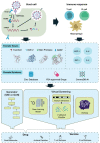Artificial Intelligence for COVID-19 Drug Discovery and Vaccine Development
- PMID: 33733182
- PMCID: PMC7861281
- DOI: 10.3389/frai.2020.00065
Artificial Intelligence for COVID-19 Drug Discovery and Vaccine Development
Abstract
SARS-COV-2 has roused the scientific community with a call to action to combat the growing pandemic. At the time of this writing, there are as yet no novel antiviral agents or approved vaccines available for deployment as a frontline defense. Understanding the pathobiology of COVID-19 could aid scientists in their discovery of potent antivirals by elucidating unexplored viral pathways. One method for accomplishing this is the leveraging of computational methods to discover new candidate drugs and vaccines in silico. In the last decade, machine learning-based models, trained on specific biomolecules, have offered inexpensive and rapid implementation methods for the discovery of effective viral therapies. Given a target biomolecule, these models are capable of predicting inhibitor candidates in a structural-based manner. If enough data are presented to a model, it can aid the search for a drug or vaccine candidate by identifying patterns within the data. In this review, we focus on the recent advances of COVID-19 drug and vaccine development using artificial intelligence and the potential of intelligent training for the discovery of COVID-19 therapeutics. To facilitate applications of deep learning for SARS-COV-2, we highlight multiple molecular targets of COVID-19, inhibition of which may increase patient survival. Moreover, we present CoronaDB-AI, a dataset of compounds, peptides, and epitopes discovered either in silico or in vitro that can be potentially used for training models in order to extract COVID-19 treatment. The information and datasets provided in this review can be used to train deep learning-based models and accelerate the discovery of effective viral therapies.
Keywords: COVID-19; SARS-COV-2; artificial intelligence; deep learning; drug; vaccine.
Copyright © 2020 Keshavarzi Arshadi, Webb, Salem, Cruz, Calad-Thomson, Ghadirian, Collins, Diez-Cecilia, Kelly, Goodarzi and Yuan.
Figures
References
-
- Abbasi B. A. (2020). Identification_of_vaccine_targets_and_design_of_vaccine_against_SARS. OSF Preprints. 10.31219/osf.io/f8zyw - DOI
-
- Alaghband M., Yousefi N., Garibay I. (2020). FePh: an annotated facial expression dataset for the RWTH-PHOENIX-weather 2014 Dataset. arXiv: 2003.08759v1. Available online at: https://arxiv.org/pdf/2003.08759.pdf
Publication types
LinkOut - more resources
Full Text Sources
Miscellaneous


